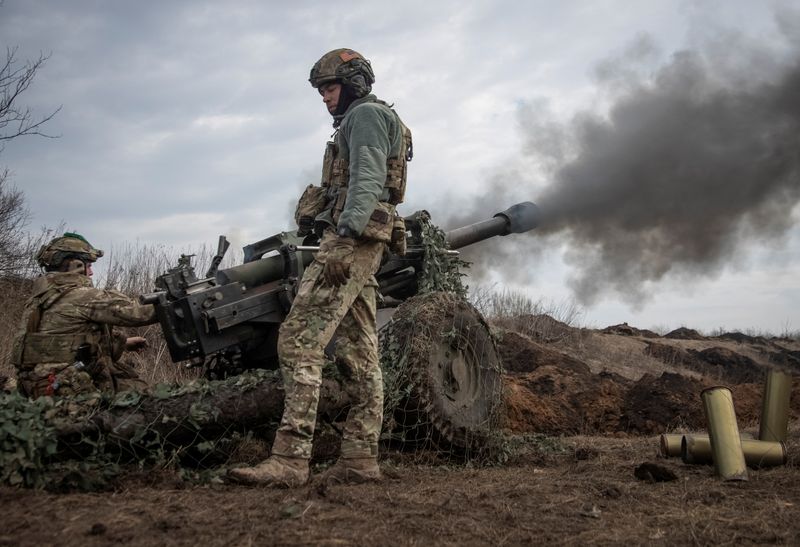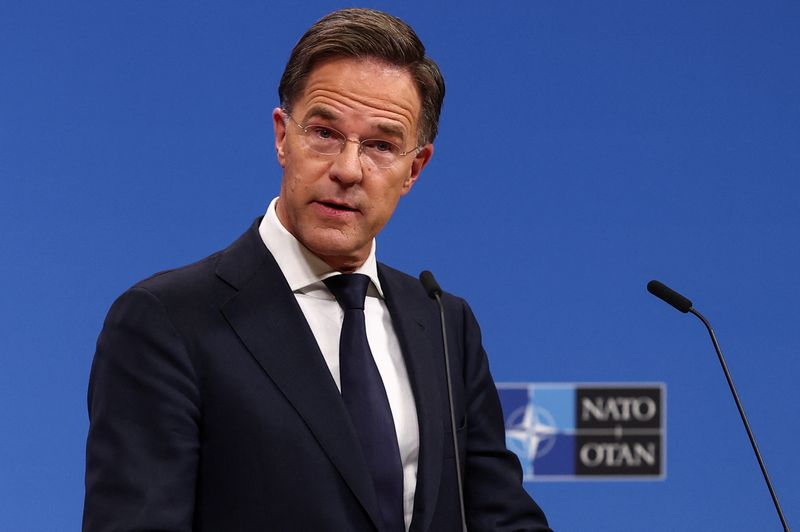By Phil Stewart and Andrew Gray
WASHINGTON/BRUSSELS (Reuters) -The U.S. will not impose new limits on Ukraine's use of American weapons if North Korea joins Russia's war, the Pentagon said on Monday, as NATO said North Korean military units had been deployed to the Kursk region in Russia.
The North Korea deployment is fanning Western concerns that the 2-1/2-year conflict in Ukraine could widen, even as attention shifts to the Middle East.
It could signal how Russia hopes to offset mounting battlefield losses and continue making slow, steady gains in eastern Ukraine.
"The deepening military cooperation between Russia and North Korea is a threat to both Indo-Pacific and Euro-Atlantic security," NATO Secretary-General Mark Rutte told reporters after talks with a South Korean delegation about the North Korean deployments.
U.S. President Joe Biden said the development was "very dangerous."
The Pentagon estimated 10,000 North Korean troops had been deployed to eastern Russia for training, up from an estimate of 3,000 troops last Wednesday.
"A portion of those soldiers have already moved closer to Ukraine, and we are increasingly concerned that Russia intends to use these soldiers in combat or to support combat operations against Ukrainian forces in Russia's Kursk Oblast near the border with Ukraine," said Pentagon spokesperson Sabrina Singh, using a term for a Russian region.
The Kremlin had initially dismissed reports about a North Korean deployment as "fake news". But Putin on Thursday did not deny North Korean troops were in Russia and said it was Moscow's business how to implement a partnership treaty with Pyongyang.
The Russian leader also said over the weekend that Moscow will respond accordingly if the U.S. and its allies help Ukraine to strike deep into Russia, with Moscow seeing the West's potential approval as "direct involvement of NATO" into the war.
The United States, however, has given no indication that it will approve Ukraine's deep strike request.
A North Korean foreign ministry official did not confirm media reports about a troop deployment to Russia but said if Pyongyang had taken such action, he believed it would be in line with international norms.
Ukrainian military intelligence said on Thursday that the first North Korean units had been recorded in the Kursk border region, where Ukrainian troops have been operating since staging a major incursion in August.
But the Pentagon declined to confirm that North Korean forces were already in Kursk.
"It is likely that they are moving in that direction towards Kursk. But I don't have more details just yet," Singh said.
Ukrainian President Volodymyr Zelenskiy said the move was an escalation by Russia.
Ukrainian Foreign Minister Andrii Sybiha said Kyiv had been warning about the deployment for weeks, and accused allies of failing to deliver a strong response.
"The bottom line: listen to Ukraine. The solution: lift restrictions on our long-range strikes against Russia now," he said on X.
Since their leaders met in Russia's Far East last year, North Korea and Russia have upgraded their military ties. They met again in June to sign a comprehensive strategic partnership that includes a mutual defense pact.
A flurry of bilateral visits of high-ranked officials have followed between the two countries, which share a small piece of border. North Korea's foreign minister Choe Son Hui departed Pyongyang on Monday for her second trip to Russia in six weeks.
Rutte said the the deployment of North Korean troops was a sign of "growing desperation" on Putin's part, Rutte said.
"Over 600,000 Russian soldiers have been killed or wounded in Putin’s war and he is unable to sustain his assault on Ukraine without foreign support," Rutte said.
The Ukrainian president's chief of staff, Andriy Yermak, said sanctions alone would not be a sufficient response to North Korean involvement.

He added that Kyiv needs "weapons and a clear plan to prevent North Korea's expanded involvement".
"The enemy understands strength. Our allies have this strength," Yermak said on X.
